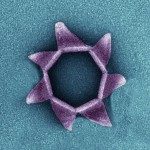Lien vers Pubmed [PMID] – 9882656
J. Bacteriol. 1999 Jan;181(2):434-43
Occurrence of the hsp70 (dnaK) gene was investigated in various members of the domain Archaea comprising both euryarchaeotes and crenarchaeotes and in the hyperthermophilic bacteria Aquifex pyrophilus and Thermotoga maritima representing the deepest offshoots in phylogenetic trees of bacterial 16S rRNA sequences. The gene was not detected in 8 of 10 archaea examined but was found in A. pyrophilus and T. maritima, from which it was cloned and sequenced. Comparative analyses of the HSP70 amino acid sequences encoded in these genes, and others in the databases, showed that (i) in accordance with the vicinities seen in rRNA-based trees, the proteins from A. pyrophilus and T. maritima form a thermophilic cluster with that from the green nonsulfur bacterium Thermomicrobium roseum and are unrelated to their counterparts from gram-positive bacteria, proteobacteria/mitochondria, chlamydiae/spirochetes, deinococci, and cyanobacteria/chloroplasts; (ii) the T. maritima HSP70 clusters with the homologues from the archaea Methanobacterium thermoautotrophicum and Thermoplasma acidophilum, in contrast to the postulated unique kinship between archaea and gram-positive bacteria; and (iii) there are exceptions to the reported association between an insert in HSP70 and gram negativity, or vice versa, absence of insert and gram positivity. Notably, the HSP70 from T. maritima lacks the insert, although T. maritima is phylogenetically unrelated to the gram-positive bacteria. These results, along with the absence of hsp70 (dnaK) in various archaea and its presence in others, suggest that (i) different taxa retained either one or the other of two hsp70 (dnaK) versions (with or without insert), regardless of phylogenetic position; and (ii) archaea are aboriginally devoid of hsp70 (dnaK), and those that have it must have received it from phylogenetically diverse bacteria via lateral gene transfer events that did not involve replacement of an endogenous hsp70 (dnaK) gene.

